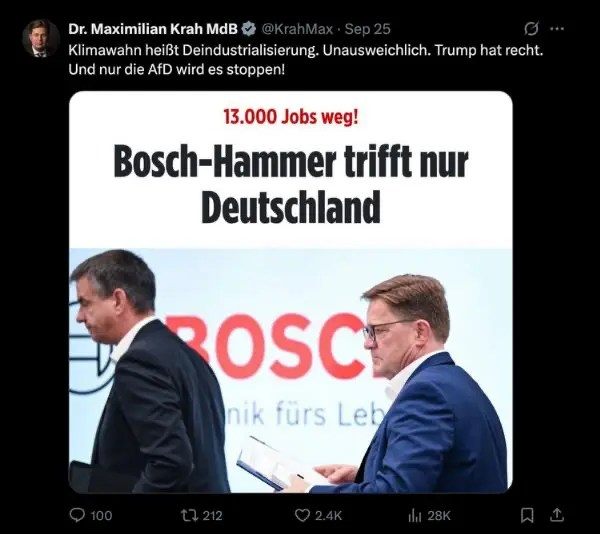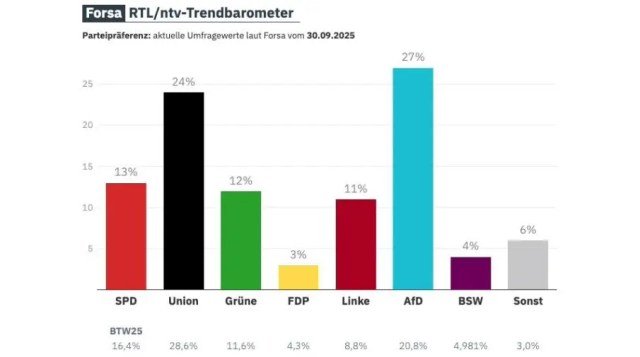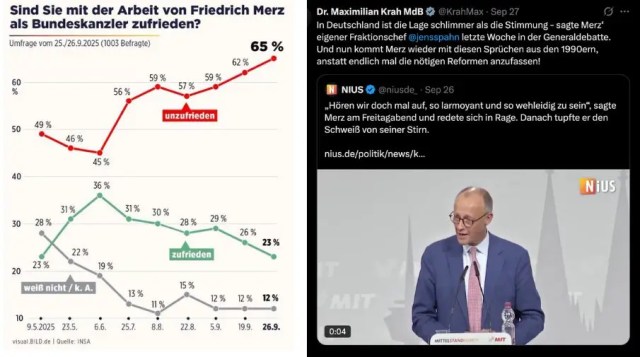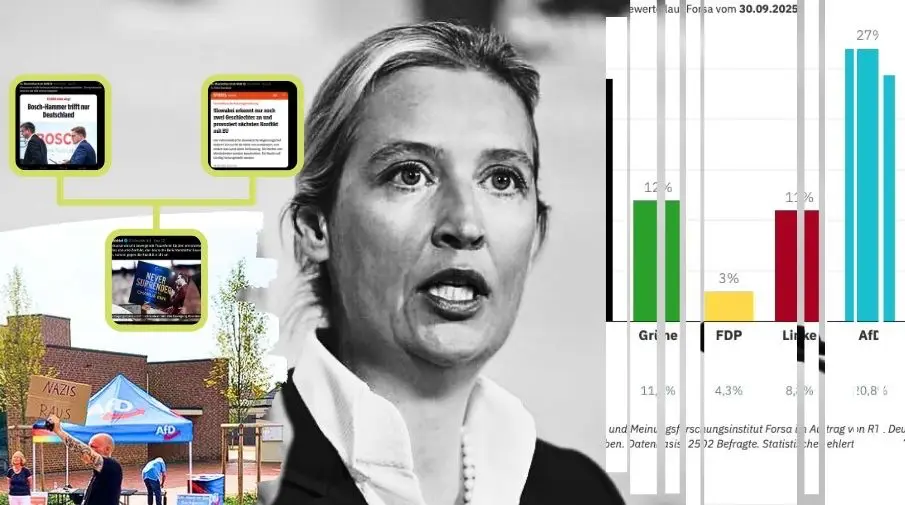The Federal Republic is reeling. Not suddenly, not unexpectedly, but with the creeping certainty of a train that has long since passed the switch. What plays out in the social media feeds of right-wing politicians is more than political banter – it is the script of a transformation that no one ordered and yet everyone is carrying along.
Maximilian Krah, former AfD member of the European Parliament – the Dresden General Prosecutor's Office is currently investigating possible money flows from Russia and China as well as the suspicion of bribery of a member of parliament. In parallel, a case regarding alleged bribery in office and possible money laundering in connection with his work in the European Parliament is ongoing – proclaims on X the salvation through Trump and his party. "Climate mania means deindustrialization. Inevitable. Trump is right. And only the AfD will stop it!" The words echo through the digital space as Bosch cuts 13,000 jobs. Reality and its interpretation drift apart like continental plates, and in the gap that emerges something new grows, something disturbing.

From an economic perspective, from research and conversations with experts, it is clear: The main responsibility for today's shambles lies with right-wing politics, which already in opposition torpedoed the necessary transformation process through blocking motions, climate denial and rhetoric of hate. They did not govern, but by constant pressure, by fueling fear of "bans" and "climate dictatorship", they poisoned the entire political climate and thereby prevented clear decisions. This uncertainty forced companies like Bosch into a dangerous limbo – leaving old markets too late, entering new ones too weakly. The result is lost years that today cost thousands of jobs.
The CO₂ price is deliberately degraded by Maximilian Krah into a political catchphrase. He claims that one only needs to "forget the climate mania", then the price will disappear – as if global warming were a mere matter of opinion and as if physical laws could be overridden by parliamentary decree. But that is exactly where the fundamental error lies. The CO₂ price is not an ideological gimmick, but a market-based instrument that makes the cost of emissions visible and promotes innovation in climate-friendly technologies. Anyone who defames it ignores the fact that companies and investors need planning security in order to invest in future technologies. If this security is destroyed, it harms not only the climate, but also the competitiveness of German and European companies, which are already under pressure globally. Krah is doubly wrong: he denies scientific realities and he prevents economic adjustments that in the long run decide over jobs and prosperity. To defame the CO₂ price as "climate mania" is not only to block climate protection, but deliberately to weaken the foundations of an innovation-driven economy.

Maximilian Krah abuses a real Handelsblatt cover to slip in his own slogans – making it look as if the polemic came directly from the article. In truth, Handelsblatt reported soberly that the rising CO₂ price burdens industry because free certificates are running out and costs are rising. Krah turns this into the pretext that the price is merely "political" and would disappear if one forgot the "climate mania". Just like Trump, he works with distortion: serious reporting is misused as a stage to sell ideology as fact.
The transatlantic brotherhood of resentment
What is emerging here is not an isolated German development. It is the Americanization of political discourse, imported through the same channels that once promised hope for global networking. Krah praises Trump's "peace plan" for the Middle East, celebrates the support of "key Islamic states". The reality? A joint declaration that above all shows one thing: the longing for simple solutions in a complexly interwoven world. The foreign ministers of Qatar, Jordan, the Emirates, Indonesia, Pakistan, Turkey, Saudi Arabia and Egypt welcomed Trump's plan to end the war in Gaza, to promote reconstruction and to strive for a two-state solution. They praised his announcement not to allow annexation of the West Bank and promised cooperation with the USA and the "parties". Hamas is deliberately not mentioned in the declaration. The peace plan itself calls for an immediate ceasefire, the release of all Israeli hostages and in return the release of Palestinian prisoners. Israel is to withdraw step by step, while an international stabilization force guarantees security. Gaza is to be administered by a technocratic committee under US supervision, Hamas is to be completely disarmed and excluded. At the same time, massive reconstruction is promised, financed by international aid and special economic zones. In the long run, Gaza is to be integrated into a Palestinian state connected with the West Bank. Realistically speaking, it is absurd to believe that Hamas would agree to this plan.

It demands their total self-abandonment – and anyone who believes that this terrorist organization would voluntarily destroy its own basis of existence is simply naive and shows how little they understand of the matter.
And it continues in the sick AfD world. Slovakia, Krah further exults, now recognizes only two genders. As if this were the yardstick of political progress, as if social reality could be erased by a constitutional amendment. In truth, fundamental rights of minorities are being curtailed: trans and intersex people lose the legal protection of their identity, medical care and social recognition come under pressure, and discrimination is legitimized by the state. What Krah celebrates as a victory means for many people very concretely the loss of dignity and security. The cultural battlefields of America are transplanted one to one onto European soil, without regard for historical experience, without understanding the local contexts of Eastern Europe, where democracy remains fragile anyway. The consequences go far beyond the affected minorities: Slovakia isolates itself in the EU, risks infringement proceedings and endangers its position in negotiations on the rule of law and subsidies. Anyone who welcomes such laws drives the country deeper into the arms of authoritarian partners like Russia or Hungary and undermines the foundations of the European project. The Spiegel article itself chose a factual, reporting tone. It described the event as a "controversial constitutional amendment", explained Prime Minister Robert Fico's closeness to autocrats and referred to the legal conflicts with the EU that result from it. The concrete consequences for minorities were hinted at – such as that rights were curtailed and EU requirements ignored – but were rather briefly presented. A deeper analysis of the social and human rights consequences was not carried out, instead the focus was on the political dimension of the impending conflict between Bratislava and Brussels.

Krah gives the appearance of being deeply religious, but his supposed piety is nothing more than a political costume. What he sells as a return to Christianity is in truth a calculated instrumentalization of faith to draw cultural boundary lines. Faith is not lived, but abused – the Holy one wobbles when she is made into the props of a party that has hate and division in its program. By embedding the prayer of Archangel Michael in a right-wing narrative framework, he abuses the religious message and turns it into a weapon against politically defined "enemies". Thus he transforms religion into a prop for his ideology – no longer a source of hope and community, but a means of maintaining power. Made in USA.

Meanwhile, Alice Weidel, based in Switzerland, continues to publicly mourn Charlie Kirk, the American right-wing populist, and laments the alleged "absurd caricature" of German reporters. What she conceals: Kirk was not a harmless activist, but a right-wing extremist hate preacher who for years made headlines with agitation against migrants, LGBTQ people and political opponents and deliberately prepared the ground for radicalization at universities. Whoever glorifies him now not only adopts the narratives of American extremists, but carries them directly into German discourse. Thus the boundaries blur between supposedly legitimate political positioning and the open adoption of enemy images that are intended to divide democracies. What seemed unthinkable yesterday is tweeted today and will be party line tomorrow – a process that not only reveals Weidel's political calculation, but also shows how willingly the AfD integrates international figures of hate into its own ideological arsenal. The critical point is not only the praise of a person who in the USA is co-responsible for the radicalization of an entire generation, but also the deliberate defamation of independent media, which rightly described Kirk as a dangerous agitator. Weidel thus proves not to be a national voice, but a loudspeaker of a transatlantic axis of extremism.

The look into the abyss
The polls paint a disturbing picture: 27 percent for the AfD, more than every fourth German. The Union follows with 24 percent, slightly behind and disoriented. Friedrich Merz, Federal Chancellor, reaches new lows in satisfaction ratings. 65 percent of respondents are dissatisfied with his work.

Merz himself seems trapped in phrases of the 1990s, while Krah sneeringly comments: "The situation is worse than the mood", a quote from Jens Spahn that suddenly becomes a rhetorical weapon against the party leadership itself. Spahn, once health minister, has long since moved away from sober policy and cultivates the pose of the permanent agitator – more AfD than CDU, more Republican culture warrior than conservative democrat. His interjections not only reinforce Merz's weakness, they also show how deeply the Union is caught in an identity struggle: between the longing for serious government policy and the temptation to play on a terrain that has long been occupied by the far right. While Krah comments on this self-destruction with glee, the Union loses its credibility as a people's party. It looks like a boxer who does not notice that the opponent has long been fighting with different rules – with headlines, social media provocations and the ruthless shortening of complex problems. Spahn's constant boundary crossings to the right contribute to the fact that the CDU/CSU is not perceived as an independent force, but as a pale copy of those forces it supposedly wants to fight. In doing so, he weakens not only Merz, but the democratic discourse as a whole.

What we are experiencing is not a normal political shift. It is the systematic erosion of democratic discourse, fueled by algorithms that reward outrage and punish differentiation. Every tweet a firebomb, every post a manifesto. The digital public, once celebrated as the agora of modernity, is mutating into an arena in which it is not arguments that win, but affects.

With Alexander Dobrindt as interior minister and Wolfram Weimer as culture chief, the federal government looks like a caricature of the German MAGA variant – conservative nostalgia meets culture-war pose, as if Trump had been translated into Bavarian and Biedermeier.
The mechanics of radicalization
Social media is not only a medium, it is the motor of this development. The platforms, designed in Silicon Valley, optimized for engagement at any cost, become fire accelerators of social division. Krah, Weidel and their comrades have understood what the democratic center is only beginning to grasp: In the economy of attention, noise pays off. Every wave of outrage carries them higher, every scandal makes them more visible. The traditional gatekeepers of information – journalists, scientists, experts – are bypassed, their classifications discredited as "lying press". Instead, a parallel public sphere establishes itself in which alternative facts are no longer questioned, but celebrated.
The question that German society must ask itself is fundamental: Are our defense mechanisms sufficient? Or does it require a fundamental reorientation in dealing with the digital firebombs that are washed into our timelines every day?
The price of passivity
History does not repeat itself, but it rhymes, it is said. The rhyme that is emerging here should alarm every democrat. When 27 percent of a population are willing to follow a party that openly sympathizes with autocrats, denies scientific knowledge and stigmatizes social minorities, then more is at stake than a legislative period.
The numbers of the AfD in East Germany are alarming and should make us think: Reunification is not a quick shot, but a process that takes decades – realistically more than half a century. The AfD did not even exist at the time of German reunification in 1989/90 – it was only founded in 2013, a point that is often overlooked. Anyone who measures the situation solely by individual hardships overlooks the larger world situation and the structural challenges that still separate East and West. The electoral decisions in the East rather exacerbate the problem, because they promote radical solutions instead of constructive consolidation. Those who long for authoritarian order can give their vote to the AfD – but the awakening will be brutal when these forces come to power: Especially the East would then be hit much harder, and from their own history one should actually have learned what consequences that has. At the same time, one must not ignore reality: Many people in Germany are still comparatively well off, even if there are many fates and real problems, mostly among the weakest in society. Housing shortage, high taxes and an utterly overblown bureaucracy, one of the biggest factors for a sluggish economy and corporate relocation. Citizen's allowance applications in Germany are not handed out, they are a grueling, often humiliating process that society hardly notices. Behind the sober forms lie humiliations, long waiting times and a climate of mistrust that hits those who are already on the margins. In January 2026, we will accompany and document two specific cases over a period of 14 days, to show what these people actually have to endure – from bureaucratic harassment to existential uncertainty. Yes, there are always black sheep, but they are not primarily found among those seeking help, but in the upper echelons of society, where responsibility is suppressed and solidarity is gladly preached but rarely lived. That is precisely why what is needed is sober analysis, patience and realistic policy instead of hysteria and quick populist solutions.
The tools of subversion have become more subtle, the methods more refined. No march on Rome, no Reichstag fire – instead the steady drip of digital disinformation that hollows out the stone of democratic certainties. Every post a small crack in the social foundation, every shared fake another erosion of trust. What must follow are not only likes and outrage. What must follow is a social mobilization that goes beyond Sunday speeches. It requires digital literacy in schools, critical engagement with sources, resilience against manipulation. It requires platforms that take responsibility and politicians who understand that populism is not fought with pandering, but with attitude.
The hours of decision
Germany stands at a crossroads. The Federal Republic, born from the rubble of totalitarianism, built on the foundation of "Never again", is confronted with forces that are undermining precisely this foundation. The lessons of history are fading, drowned out by the noise of the present. The Americanization of German politics is not a law of nature, but a development that can be shaped. It is not too late yet to set the course differently. But that requires more than dutiful distancing and ritualized outrage. It requires a democracy capable of defending itself, one that not only proclaims its values, but actively defends them.

The alternative is bleak: a country in which facts become a matter of negotiation, in which science is replaced by ideology, in which the complexity of the world is reduced to binary codes. A country that forgets its own history and is therefore doomed to repeat it in a new form. The time for watching is over. What counts now are not words, but deeds. Not outrage, but engagement. Not withdrawal into the private sphere, but the move into the public. Democracy does not defend itself – it needs people who stand up for it, every day, in every tweet, in every conversation, in every voting booth. Germany stands at the crossroads. The shadow of America lies over the country, but it is not yet too dark to recognize the right path.
Investigative journalism requires courage, conviction – and your support.
Please also strengthen our journalistic fight against right-wing populism and human rights violations. We do not want to finance ourselves through a paywall so that everyone can read our research – regardless of income or origin. Thank you very much!


Mann, mann, mann, das sind eindringliche Worte, nur, warum ist das offensichtlich so schwer zu verstehen? Ich selbst bin kein Überflieger und schon gar nicht wohlhabend, aber ich blicke über den Tellerrand und besitze Empathie.
Danke, wir haben versucht es sehr sachlich aufzuarbeiten, auch wirtschaftliche Belange…
Ich fürchte nur, dass es vielleicht längst für wirkungsvolle Gegenmaßnahmen zu spät sein könnte. Unsere „Zerstörer der Welten“ denken in ganz langen Zeiträumen, unsere Leute allenfalls in Legislaturperioden. Und während diese noch gebannt auf ihre „Faxgeräte schauen“, nutzen unsere bösen Gegenspieler sämtliche neuen technischen Errungenschaften, um ihre ideologischen Angelruten auszuwerfen. Aber Hoffnung stirbt ja bekanntlich immer zuletzt. Nur: Irgendwann muss sich auch die Hoffnung der möglicherweise bitteren Realität stellen.
Wir sind seit Ende der 1980er Jahre voll im Thema Klima drin. Und Studien wie jene vom renommierten australischen Think Tank „Breakthrough“ (liegt allen Entscheidern dieser Welt vor!) sowie auch viele ähnliche Arbeiten der klügsten Köpfe unserer aktuellen Welt in diesem Genre gaben uns schon vor Jahren bei einem „weiter so“ ein Zeitfenster von nur noch etwa 30 Jahren, bis sich Homo sapiens im bereits laufenden, sechstgrößten Massenaussterben dieses Planeten (bis zu 158 Arten verlassen bereits jetzt schon TAGTÄGLICH unsere Erde für immer) unwiderruflich auf Platz eins eben jener Liste wiederfindet.
Und wer das alles live in der ersten Reihe sitzend mit Kaltgetränk und ’ner Tüte Kartoffelchips mitverfolgen will, kann das gerne hier tun (zumindest, solange das nicht von der aktuellen US-Regierung irgendwann demnächst abgeschaltet wird):
https://science.nasa.gov/earth/explore/earth-indicators/
Danke für diesen Bericht Rainer.
Faschisten sind Faschisten.
Es läuft immer gleich ab.
Laut sein, kurze Parolen, Andersdenkende diffamieren, hetzen, Angst schüren …
Aber was Faschisten NIE haben, sind echte Lösungen.
Leider wollen viele Menschen sich nicht mit „komplizierten“ Themen beschäftigen.
Für Fußball, Kneipe etc ist Zeit da.
Aber nicht für den Erhalt der Demokratie.
Selber denken? Viel zu anstrengend.
Warum hat die AfD gerade in den Ostdeutschen Bundesländern so viele Stimmen?
Es gab keine Aufarbeitung der Nazivergangenheit und 40 Jahre wurde ihnen eingetrichtert, was man „zu denken“ hatte.
Politik war kein Thema. SED und Lobhudelei auf Russland. Mehr gab es nicht.
Ich hoffe, dass wir den Zeitpunkt für ein AfD Verbot nicht verpasst haben.
Denn wenn eine Partei im Gesamtbild vor CDU, SPD, Grünen liegt, bedeutet es leider, dass jeder 4. Deutsche die AfD befürwortet.